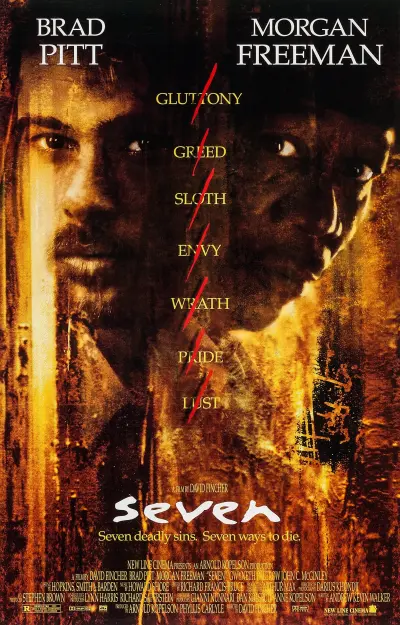
Ah, Se7en Now there's a film that lingers in your mind long after the final credits roll. This neo-noir psychological crime thriller, directed by the masterful David Fincher, is one of those movies that grabs hold of your psyche and refuses to let go. At its core, Se7en is a story about two detectives, the world-weary William Somerset and the idealistic David Mills, who are hunting down a serial killer using the seven deadly sins as his playbook. It's a murky dive into the depths of human depravity and a stark meditation on the nature of evil.
As Somerset and Mills get drawn deeper into the case, the scenes are enough to make your skin crawl. We’re not just witnesses to the crimes; we're forced to confront the philosophical underpinnings of each sin. The killer, John Doe, serves as a dark, twisted philosopher, questioning the moral fabric of a society that he believes has become apathetic to sin. Doe's gruesome tableaus aren't just murders; each is a sermon on the decay of humanity, a reflection of a city that oozes sin from its very pores.
The beauty—if one can call it that—of Se7en lies in its unflinching exploration of its characters. Somerset, with his calm demeanor and seasoned perspective, is on the brink of retirement, disillusioned with a world he feels he can no longer save. Mills, on the other hand, is fiery and passionate, still believing he can make a difference. Their dynamic is fascinating; they're bonded by the pursuit of justice yet divided by their view of the world. This duality is a central theme, as Se7en doesn't just expose the evils of the killer, but the fraying edges of its heroes, too.
The scenario's meaning is rich with these dualities as Se7en is more than a mere cat-and-mouse chase; it’s an examination of contrast—sin versus virtue, cynicism versus idealism, the individual versus society. The city itself, perpetually drenched in rain, feels like a character, symbolizing a biblical flood meant to cleanse a wicked world. Each sin—gluttony, greed, sloth, envy, wrath, pride, and lust—is a canvas on which the film paints a stark picture of modern life's moral failings.
The climax of Se7en is where it transcends the confines of its genre and becomes a thing of gut-wrenching legend. The audience, like Mills, is desperate for answers, for closure. But in true Fincher fashion, we're denied the comfort of simple resolutions. That final twist, involving a box and the revelation of the last two sins, thrusts us into a realm of horror that is all too psychological and disturbingly personal. It's a testament to the narrative's power that the shock doesn't come from what you see, but from what you don't—Fincher masterfully uses the viewers' imagination against them.
In the end, Se7en isn't just about the defeat of a serial killer. It’s an introspective journey that asks its audience to question the nature of evil and our own complicity in the face of societal decay. The story's conclusion leaves us dangling over the abyss of nihilism, pondering Somerset's haunting words: "Ernest Hemingway once wrote, 'The world is a fine place and worth fighting for.' I agree with the second part." As the credits roll and we're left in the silence of our thoughts, '.Se7en.' challenges us to consider our own answer to that statement—an unsettling, yet profound, cinematic experience that lingers like the remnants of a nightmare.

